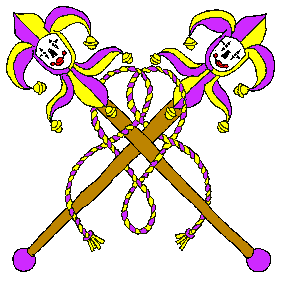
An ongoing site with articles and links on
Jesters, Fools, Clowns, Harlequins, Tricksters, Punsters and Buffoons
as they apply to the Middle Ages and the SCA.
(with a few modern references)
FOOLERY PAGE

An ongoing site with articles and links on
Jesters, Fools, Clowns, Harlequins, Tricksters, Punsters and
Buffoons
as they apply to the Middle Ages and the SCA.
(with a few modern
references)
I have the
great honor to be a member of the DFG.
(Drachenwald Fool's Guild)
This page
is dedicated to Lord Merigold the Mirthful,
friend and Fool Extraordinaire.
<THWACK!>

I also have
the distinct honor to a Full Fool of the Fool's Court.
Thanks to
Lord Roberto Carlos Dominguez,
friend and fellow-fool.

I also have
the great honor of having been the
Captain of the Ship of Fools
in the Barony of Forgotten Sea.
(The ship's name is
The Endeavor, because it is a Foolish Endeavor.)
Thanks to
all the wonderful crew of
the Ship of fools.
Related Fun
The Official Miss Zelda Website
(The only
Advice columnist for the "Medievally Challenged")
The Tudor Times
(A
satirical look at history)
Robert Armin: Fool AND Genius
Robert Armin was perhaps the single person to have most dramatically affected William Shakespeare’s work. Little is really known about the history of Armin. In 1599 he joined Lord Chamberlain's Men (Shakespeare's play company) and it is noted before that, he had been a member of another company (not named).
As the author M. C. Bradbook relates in her book entitled Robert Armin and Twelfth Night. ([Twelfth Night: A Casebook] Macmillan Press Ltd, 1972), Armin did influence Shakespeare's writing. "From the time that Armin joined the company Shakespeare very noticeably began to give his clowns the catechism as a form of jesting."
Fools apparently fascinated Armin because he even wrote a book upon the subject, entitled "Foole upon Foole". David Wiles, in his book entitled Shakespeare's Clown: Actor and text in the Elizabethan playhouse (Cambridge University Press, 1987), writes that Armin "was a pioneering realist in his study of how fools actually behaved. His stage fools were based on observation rather than on the recreation of an emblematic stage type".
Bradbook also points out that "Armin's interest in fools allowed Shakespeare to tap one of the richest veins in the medieval dramatic tradition: the idea that the Vice reveals vice to be folly".
We learn more about Armin’s ability from the characters that Shakespeare created. When he was creating a character, Shakespeare would take into account the style and range of the actor who was going to play the part.
Such came into play with the creation of fools that Robert Armin would play, including the Fool in King Lear, the character of Touchstone in As You Like It, and Feste (a role Armin originated) in Twelfth Night.
Nor only did Armin act in Shakespeare’s plays, he also acted in the plays of other writers. As David Wiles points out in his book, when Armin played Carlo Buffone in Jonson's Every Man Out Of His Humour, he was "impersonating a real tavern fool by the name of Charles (i.e. 'Carlo') Chester (i.e. 'jester')".
From the characters he played, Armin was obviously not a broad comedian, but a very subtle artist, whose humor could be sharp and bitter or soft and wise or touched with melancholy. Also, we can assume that he had a good voice, because the characters he played often were given songs to sing.
Armin would go on to write plays himself.
Suggested Readings:
Fools and Folly
by Clifford Davidson
1996, Medieval Institute Publications, Western Michigan
University, Kalamazoo, Michigan.
The History of Court Fools
by Dr. Doran
1966 Haksell House, New York.
A Shakespeare Jestbook, Robert
Armin's Foole upon Foole (1600):
A Critical, Old-Spelling Edition by H.F.
Lippincott
1973 Institut Für Literatur Universität Salzburg A-5020
Salzburg, Austria.
The Jester Has Lost His Jingle
by David Saltzman
The Jester Company.
Fools and Folly During the
Middle Ages and the Renaissance by
Barbara Swain
1932 Columbia University Press, New York.
The Fool. His Social and
Literary History by Enid Wilsford
1935 Farrar and Rinehart Inc.
Shakespeare's Clown:
Actor and text in the Elizabethan playhouse by David Wiles
1987 Cambridge University Press.
Robert Armin and
Twelfth Night by Muriel C.
Bradbook
1972 [Twelfth Night: A Casebook], Macmillan Press Ltd.
The King's Fool: A Book
about Medieval and Renaissance Fools by Dana Fradon.
1993 Dutton Books, New York
Missing in
Action
(Webpages
that are no longer there -- but we're looking for again)
The Jester in Medieval Society
Twelfth Night: A Motley Medley
by Stephanie
Chidester
Juggling
by Midair MacCormaic
History of the Harlequin Character
Who is Harlequin the Character?
Commedia Dell'Arte & The Harlequin
The Jester's Cap Humor Archive
If you are not familiar
with the SCA but would like to know more,
check out the following links:
| SCA | - | General Intro to the SCA | ||
| Forgotten Sea | - | Website of the group that I'm been Baron of | ||
| Cum an Iolair | - | Website of a group that I've been Seneschal of | ||
| Terminology | - | Definitions of some common SCA terms | ||
| Heraldry | - | My page on SCA Heraldry |
This Foolery page is published by Ron Knight (known in the SCA as Modar Neznanich) for the edification of the members of the Barony of Forgotten Sea, its cantons, the Shire of Cúm an Iolair and the members of the SCA. It is not a corporate publication of the Society for Creative Anachronism, Inc. and does not delineate S.C.A. policies. In cases of conflict with printed versions of material presented on these pages or it's links, the dispute will be decided in favor of the printed version unless otherwise indicated. Opinions expressed are those of the authors.
©1998,
1999, 2000, 2001, 2002, 2003, 2004, 2005, 2006 Ron Knight
Baron Modar Neznanich, OPel
e-mail: modar@everestkc.net
Back to Modar's Personal SCA Page